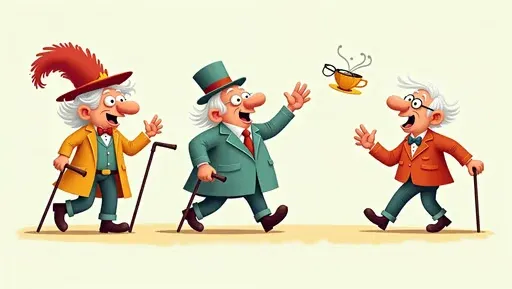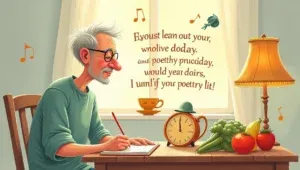I used to think ageing happened to other people — the sort who needed help opening jars and complained about the weather with alarming accuracy. Then one morning I stood up too quickly, forgot why I’d done so, and realised growing old had slipped into the room without asking.
This is not a guide. It is not advice. It is a small collection of observations from the fog, written by someone who has learned that nonsense is sometimes the most honest language available.
Introduction to Growing Old
There is a peculiar quietness to growing old. It does not arrive with fanfare. It doesn’t knock. It simply rearranges the internal filing system while you’re busy looking for your glasses — which, incidentally, are already on your head.
Vacant Space 3
A space for, possible, future development.
The process has little interest in efficiency. It prefers loops. Thoughts circle back on themselves. Names hover just out of reach. And somewhere between remembering yesterday and forgetting why you stood up, growing old reveals itself as less of a destination and more of a drifting method.
I’ve noticed that people rarely talk about how it feels. They talk about numbers, milestones, stages. But the process of growing old is not linear. It’s more like a slightly unreliable roundabout with missing exit signs.

When Growing Comes Knocking
Growing old came tapping on the back of my chair
With a hat full of questions and socks that mismatched the air.
“Happening what you can,” said the clock to the wall,
Which answered by standing and refusing to fall.
“Can do whats happening,” murmured tea to the cup,
While the spoon stirred the moment and gave it a shrug.
“What’s happening what?” asked the floor to the shoe,
Which replied it was waiting for something to do.
Growing old wore pockets that swallowed whole days,
And returned them at dusk in confusing new ways.
Growing old in later life queued neatly for thought,
Then forgot what it wanted and bought what it bought.
Growing old with age hummed a tune without sound,
While yesterday’s minutes lay scattered around.
The mirror said nothing, the calendar blinked,
And time tied its laces, then promptly unlinked.
Growing old in America waved from afar,
Then asked who was driving and where was the car.
Happening what you can echoed under the stairs,
As logic took leave and forgot its affairs.
Can do whats happening sighed sense on the shelf,
While nonsense applauded and helped itself.
Growing old laughed softly, then sat down to wait,
Quite certain it knew — just not why, nor the date.Reflections
I used to resist growing older, as if resistance itself were a plan. These days, I see it more as a negotiation. Some days I push back. Some days I compromise. And some days I let growing old have its say and make a cup of tea while it’s talking.
Living with uncertainty teaches patience — not the saintly kind, but the practical sort. The kind that accepts that today might not look like yesterday, and that tomorrow doesn’t owe us consistency. That lesson overlaps neatly with chronic discomfort, fading vision, and the gentle rewiring of expectations.
When vision softens and details blur, pieces like Through the Fog: Fading Vision remind me that clarity isn’t always visual.
When the body complains in unfamiliar dialects, Dancing Through the Discomfort puts language to sensations that don’t behave logically.
And when rhyme, nonsense, and structure collide — as they often do in my head — Rhyming the Wahls Protocol proves that order and absurdity can coexist without permission.
I’ve also learned that growing old in later life is not a retreat from meaning. If anything, it sharpens it. You stop wasting energy on things that do not return the favour. You learn to notice which thoughts are worth finishing.
Occasionally, I read broader perspectives, not for instruction but for contrast. Harvard’s overview of ageing here and Saga’s reflections on ageing well here offer useful context — but lived experience still writes the footnotes.
A small, sideways truth
There is a freedom in accepting that growing old with age does not require constant self-improvement. Sometimes maintenance is victory. Sometimes stillness is progress. Sometimes happening what you can is the most honest plan available.
Conclusion
Seen from the inside, Growing Old is less a closing chapter and more a change in punctuation.
Growing older teaches you to read between moments, while the process of growing old quietly rearranges priorities without consultation.
Whether you call it growing old in later life, growing old with age, or simply learning to live alongside time, it remains a strangely creative act — one that keeps happening, whether or not we’ve finished understanding it.
Progress with MS is measured in inches — but inches still add up
Stephenism
🎵 Soul from the Solo Blogger — Tunes from Túrail.




